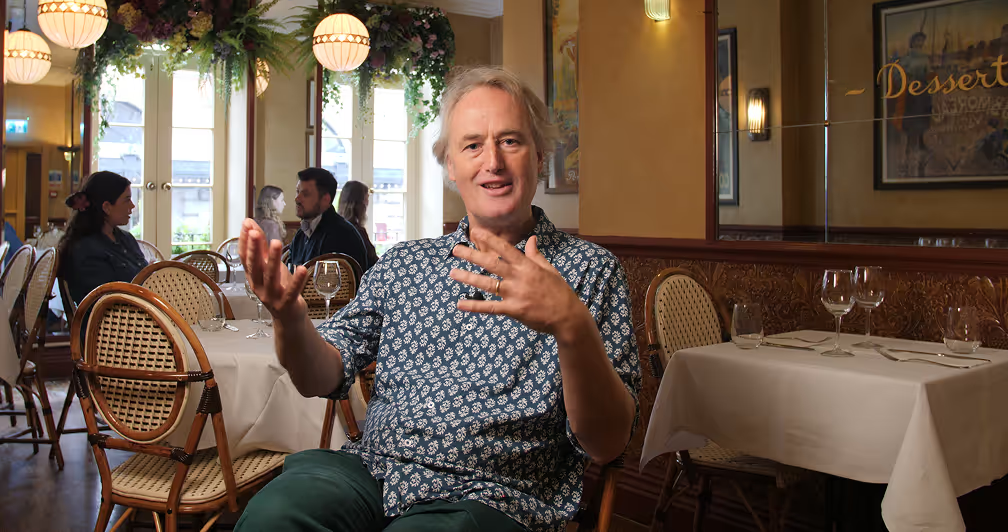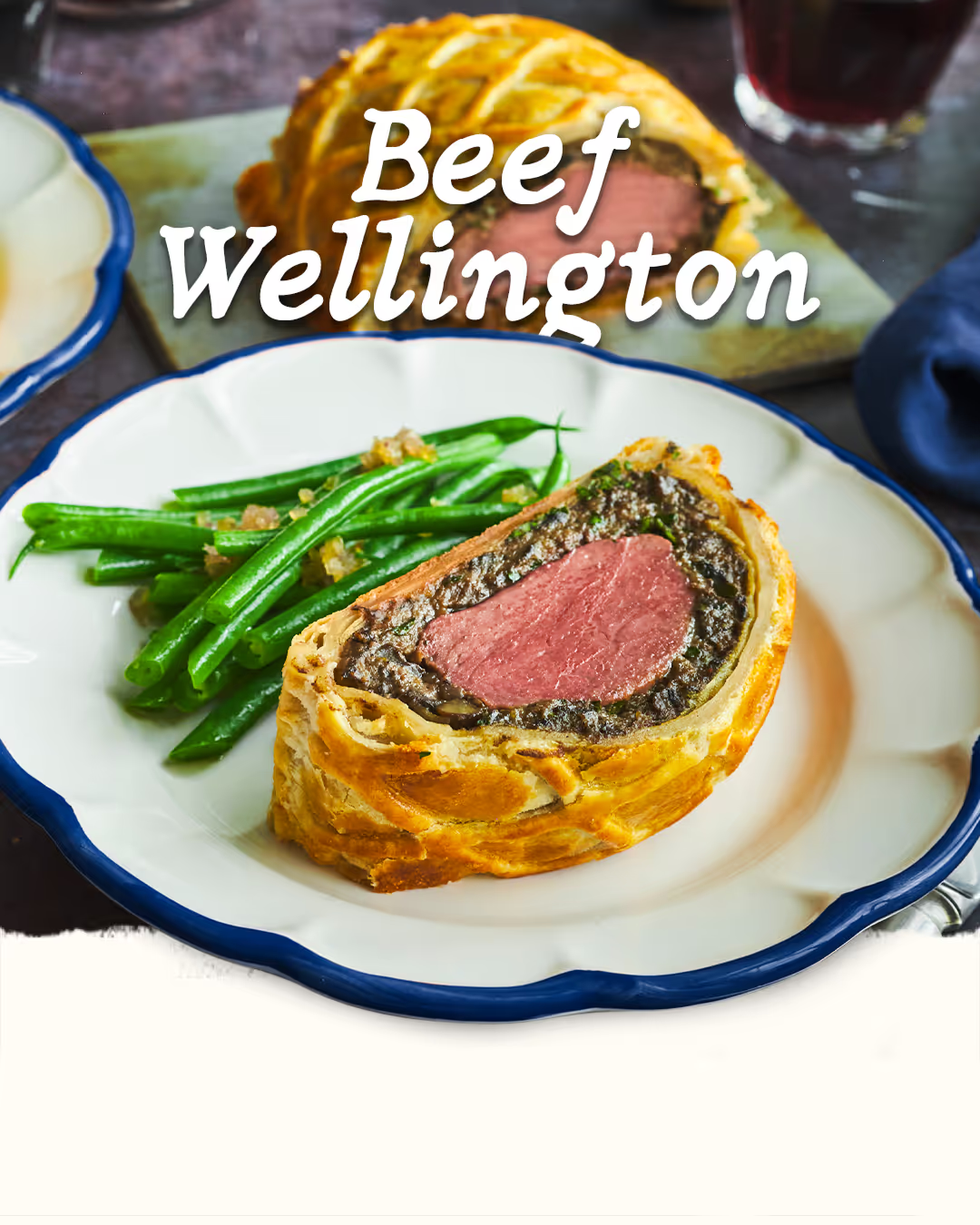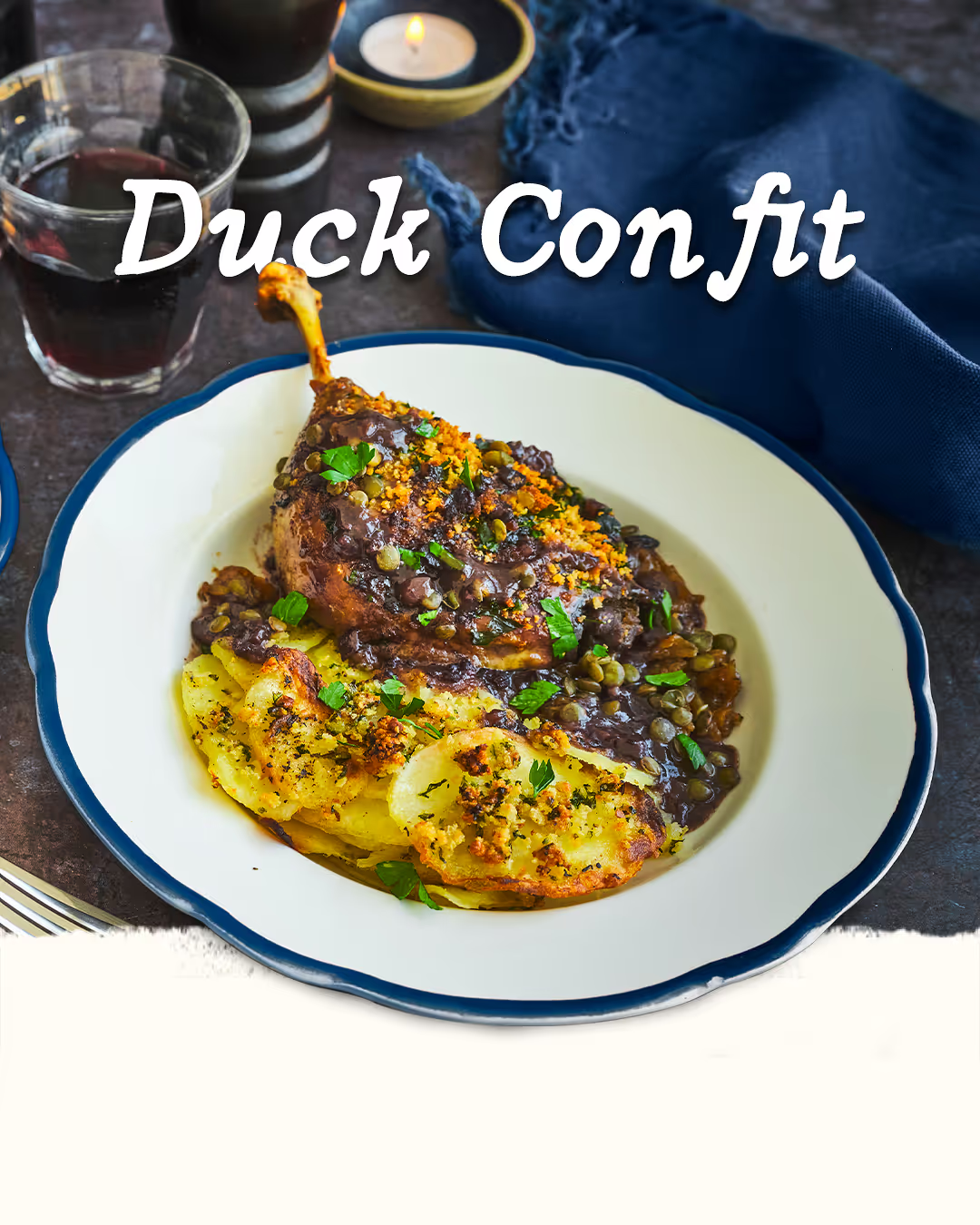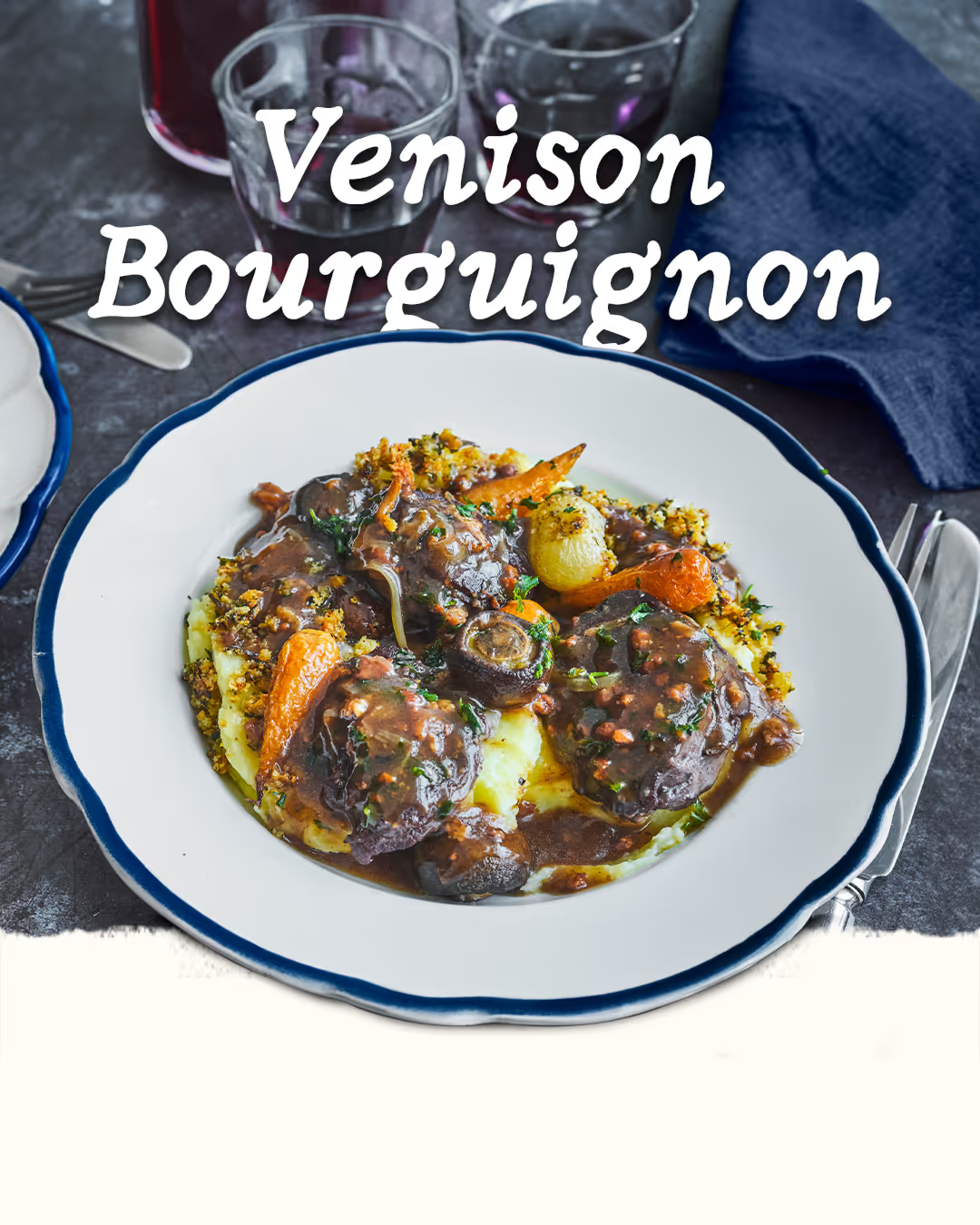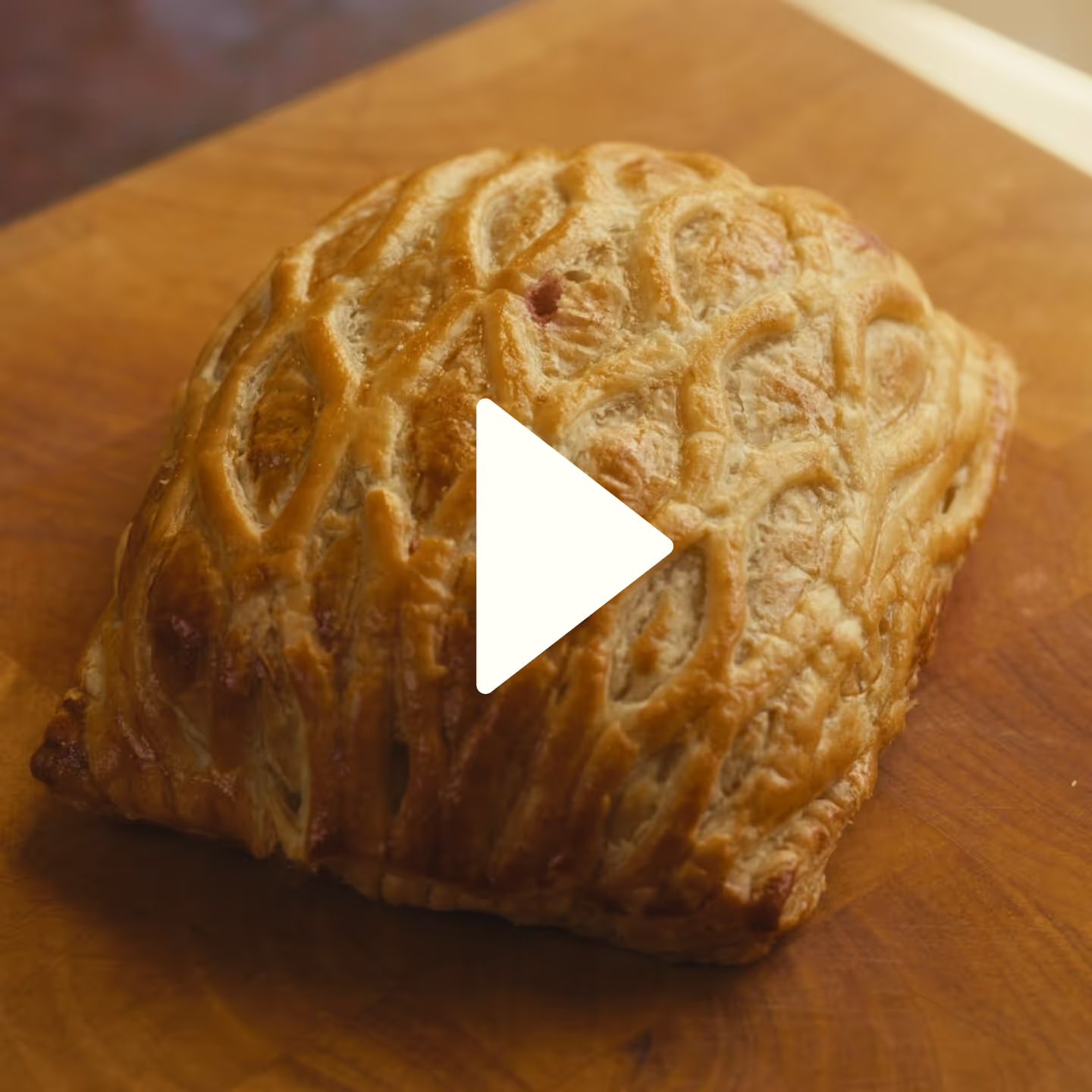Welcome To





What is Brasserie?
Our Brasserie range is a collection of our most indulgent dishes yet. It’s food that calls for candles, the good plates and a nice bottle of wine. Who says you need to go out for a restaurant quality experience? Our Brasserie dishes are hand crafted with restaurant ingredients such as prime centre-cut beef fillet and wild caught venison. Our chefs use restaurant level techniques to deliver the most delicious results, from expertly French-trimmed chicken legs to slowly confited duck legs. With our Brasserie range you can enjoy showstopping food in the comfort of your own home.
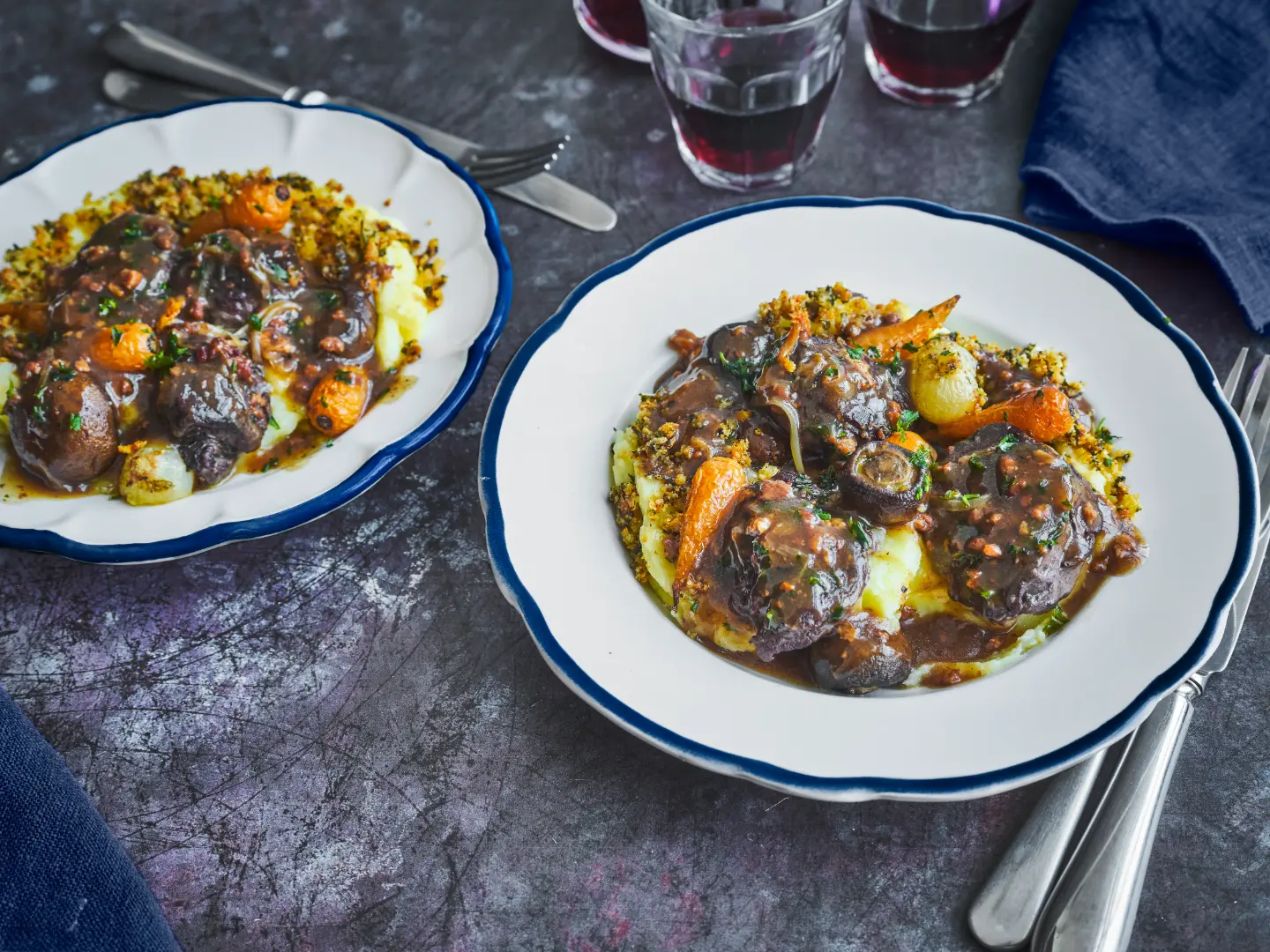

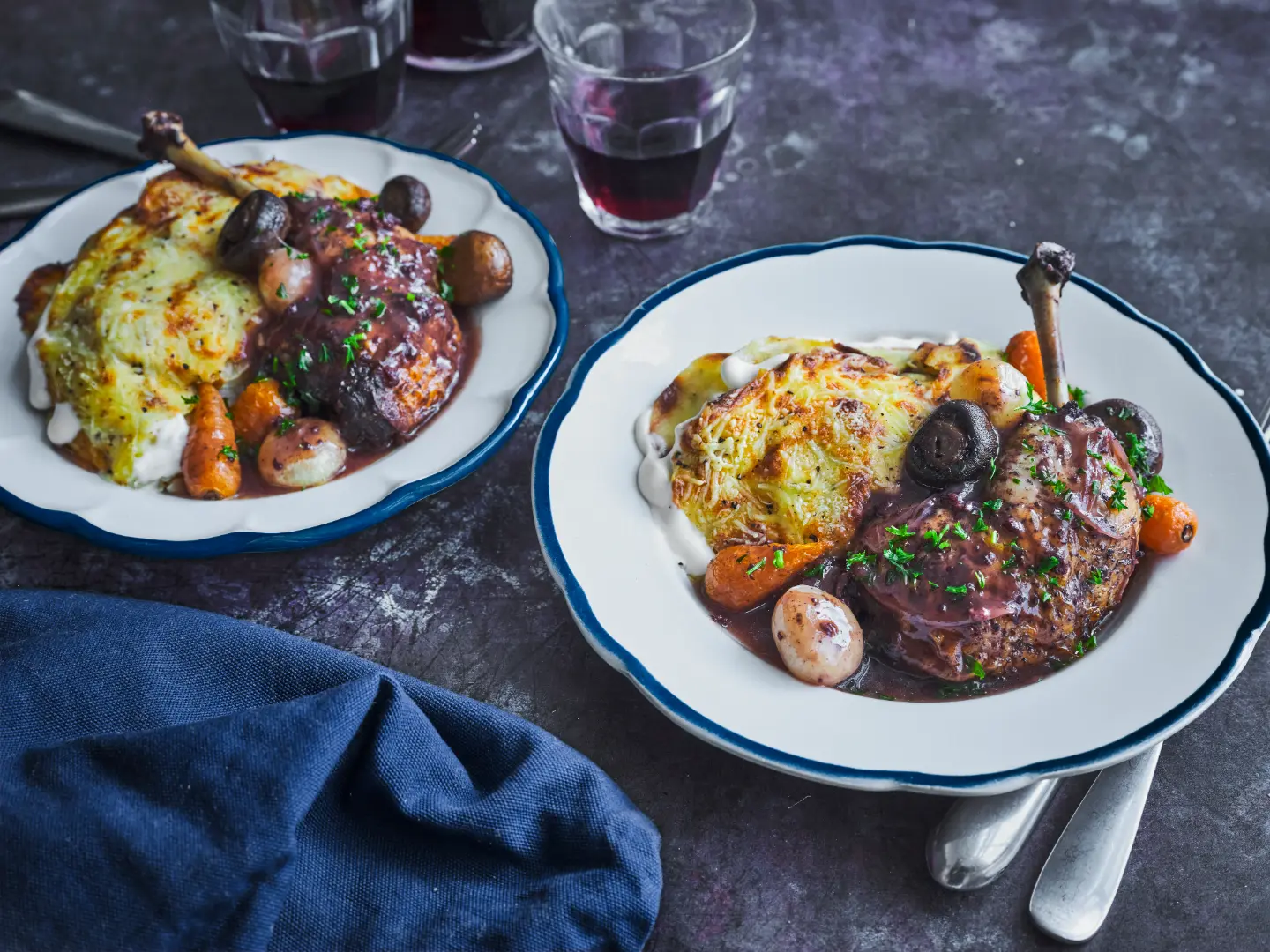
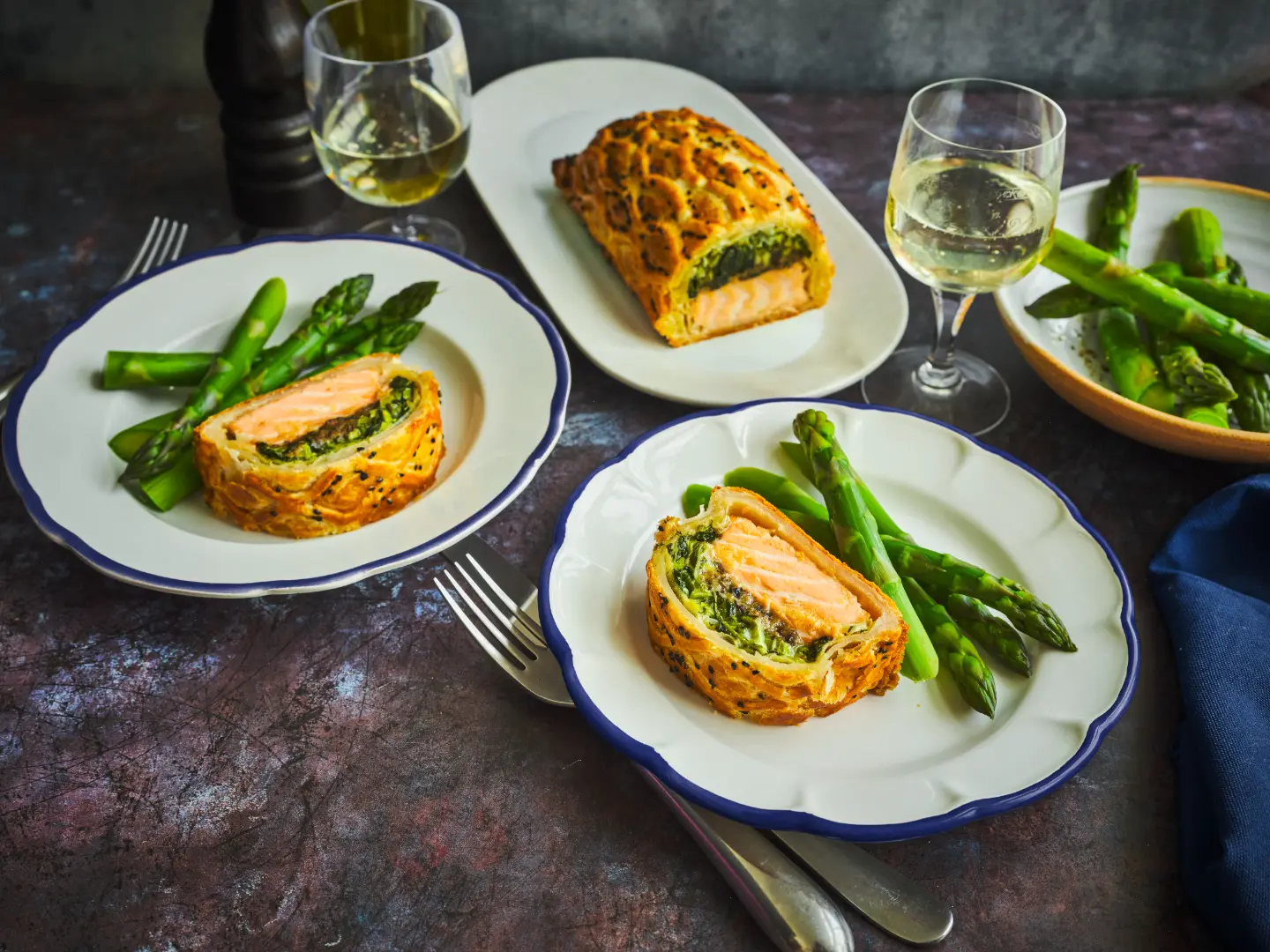

Beef Wellington
About
A centre-cut fillet of prime beef fillet starts off with a basting of Dijon mustard and thyme. It is hand rolled in a rich chestnut mushroom duxelles lifted with silky chicken liver and porcini which is then laced with Pedro Ximénez sherry and tarragon. The duxelles coated fillet is enclosed in golden puff pastry and finished with a delicate lattice. This Wellington is the ultimate centrepiece.

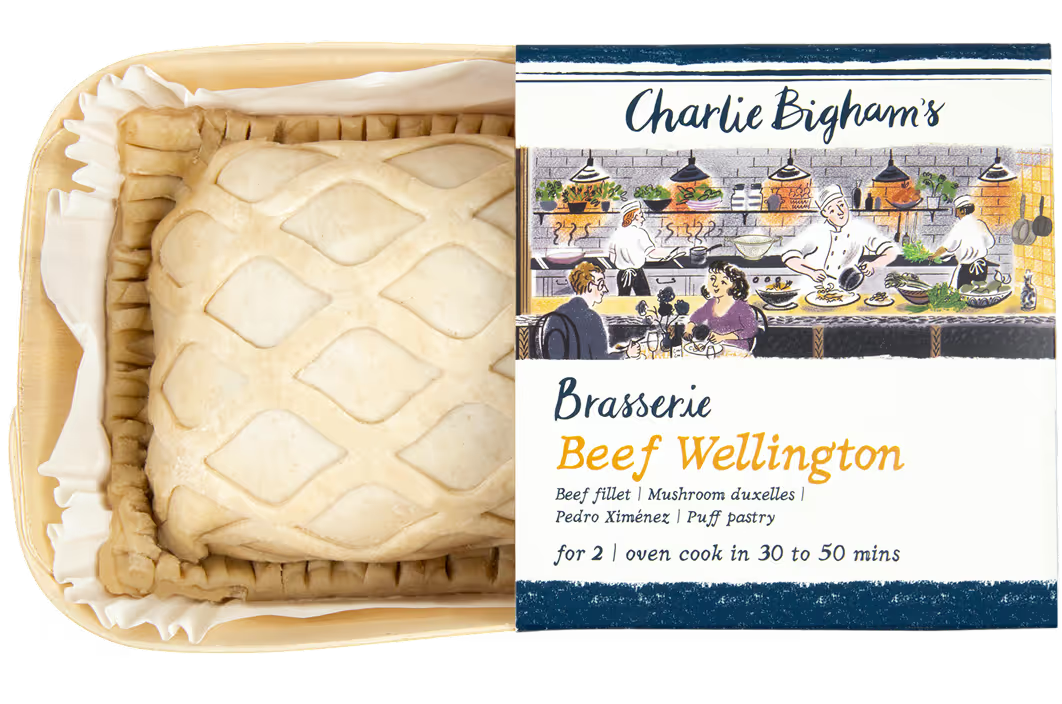
Wine Pairings
Classic Pairing: Rhone Red
Suggestion: Guigal Cotes du Rhone, £14
A classic Rhone red blend of Syrah, Grenache and Mourvedre from one of the most famous names in the region with layers of black fruits, spice and supple tannins. Perfect for a showstopping dish like Beef Wellington.
Alternative Pairing: Australian Shiraz
Suggestion: The Hedonist Shiraz, £15.50
An altogether fruitier take on the Shiraz grape from one of the leading biodynamic producers in South Australia’s McLaren Vale region, loaded with blackberry fruit flavours.
Curated by Helen McGinn

Charlie's Tips
- Cook Beef Wellington straight from the fridge, this will help keep the pastry crisp while keeping the beef pink
- For a gorgeously glossy finish, brush your Wellington with a beaten egg wash before cooking
- For an expert presentation, cut your Wellington using two knives: first, a bread knife to cut through the pastry, then once you get to the duxelles, swap to a sharp carving knife.
- For the perfect cook use a meat thermometer to measure the internal
temperature – and never skip the resting time:- Medium rare: take out of the oven after 30-35 minutes, rest for
15 minutes or until 55-58 ℃ - Medium: take out of the oven at after 35-40 minutes, rest for 15
minutes or until 60-62℃ - Medium well: take out of the oven after 45 minutes, rest 15
minutes or until 67-70℃ - Well done: take out of the oven after 50 minutes, rest for 15
minutes or until 70-73℃
- Medium rare: take out of the oven after 30-35 minutes, rest for
Suggested Side
Savoy cabbage with buttered chestnuts
1 large Savoy cabbage
100g unsweetened shelled chestnuts
40g butter
Sea salt flakes and freshly ground pepper
Instructions
Cut the cabbage in half and trim off the woody stalk and any manky outer leaves. Slice the cabbage about 1cm thick and steam or cook in a large saucepan of boiling water until tender (4-5 minutes).
Meanwhile, crumble or chop the chestnuts into smallish pieces.
Once the cabbage is cooked, drain in a colander, then put the butter, chestnuts, a pinch or so of salt and a generous amount of pepper in the pan and heat until the butter begins to sizzle.
Return the cabbage to the pan and toss well together. Serve immediately.
Salmon Wellington
About
A pin-boned fillet of sushi-grade salmon, hand wrapped in a rich chestnut mushroom, porcini and Pedro Ximénez duxelles is topped with a fresh velouté of spinach, leeks, and capers. To finish, it is encased in golden puff pastry with a hand-finished lattice. Light yet indulgent, our Salmon Wellington is a celebration of the modern bistro.

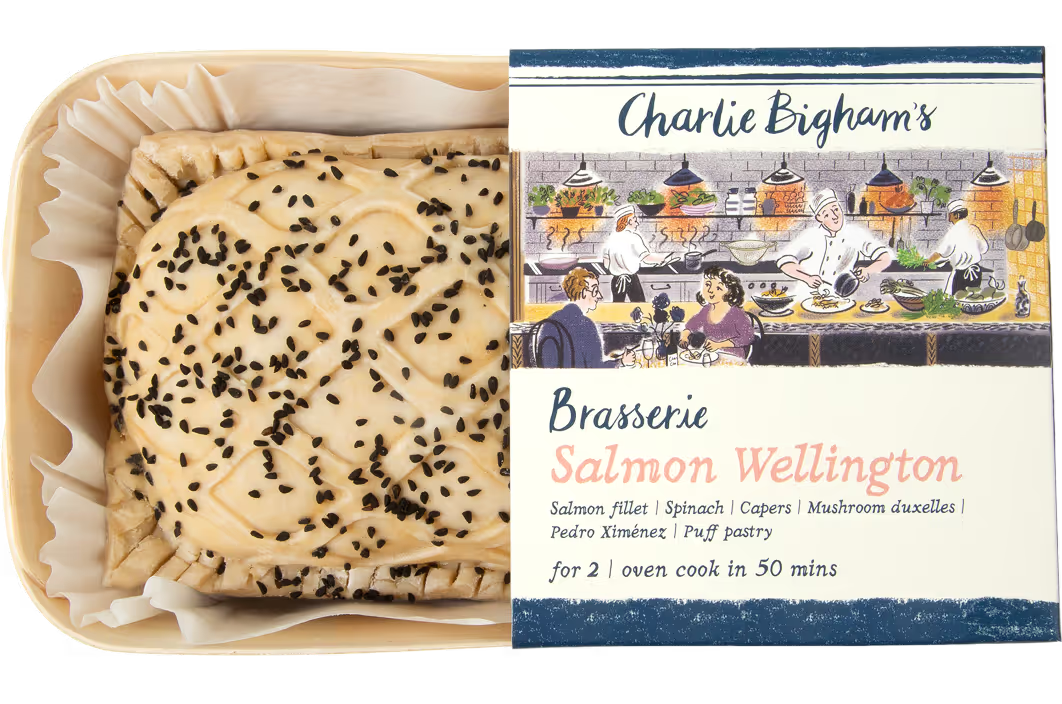
Wine Pairings
Classic Pairing: White Burgundy
Suggestion: Louis Latour White Burgundy, £18.55
The flavours in this dish call for a white with ripe, round flavours and freshness to cut through it and this White Burgundy from renowned producer Louis Latour is spot on. Stylish, elegant and balanced, the pairing brings out the flavours on the plate and in the glass beautifully.
Alternative Pairing: Rosé
Suggestion: Chapel Down English Rosé, £16
A refreshing take on rosé from the award-winning Kent-based producer, a pioneer on the English wine scene. Fresh and crisp with red fruits and a streak of citrus, it pairs perfectly with salmon.
Curated by Helen McGinn

Suggested Side
Citrus green beans with hazelnuts
500g green beans, with stalks snipped off
100g blanched hazelnuts
2 tbsp. extra virgin olive oil
Finely grated zest and juice of 1 lemon or orange
Sea salt flakes and freshly ground pepper
Instructions
Half fill a saucepan with water and bring to the boil. Toss in your green beans. Cook for 5 minutes, then tip into a sieve or colander. Immediately run under cold water until the beans are stone cold. Leave to drain.
Meanwhile, toast the hazelnuts in a frying pan, tossing occasionally until lightly browned. Tip on to a work surface and roughly chop or bash with a rolling pin.
Transfer the beans to a serving dish, toss with olive oil, lemon or orange zest and juice, salt and pepper. Finally, sprinkle over the toasted hazelnuts.
Coq Au Vin
About
French-trimmed chicken legs are marinated in red wine, garlic, and thyme for a minimum of 6 hours, roasted until golden and served atop a rich red wine sauce with smoked bacon, whole roasted chestnut mushrooms, sweet Borettane onions and tender Chantenay carrots. Paired with a luxurious potato and celeriac dauphinoise which is topped with a generous grating of Parmigiano Reggiano and Emmental, this Brasserie classic is the embodiment of rustic elegance.

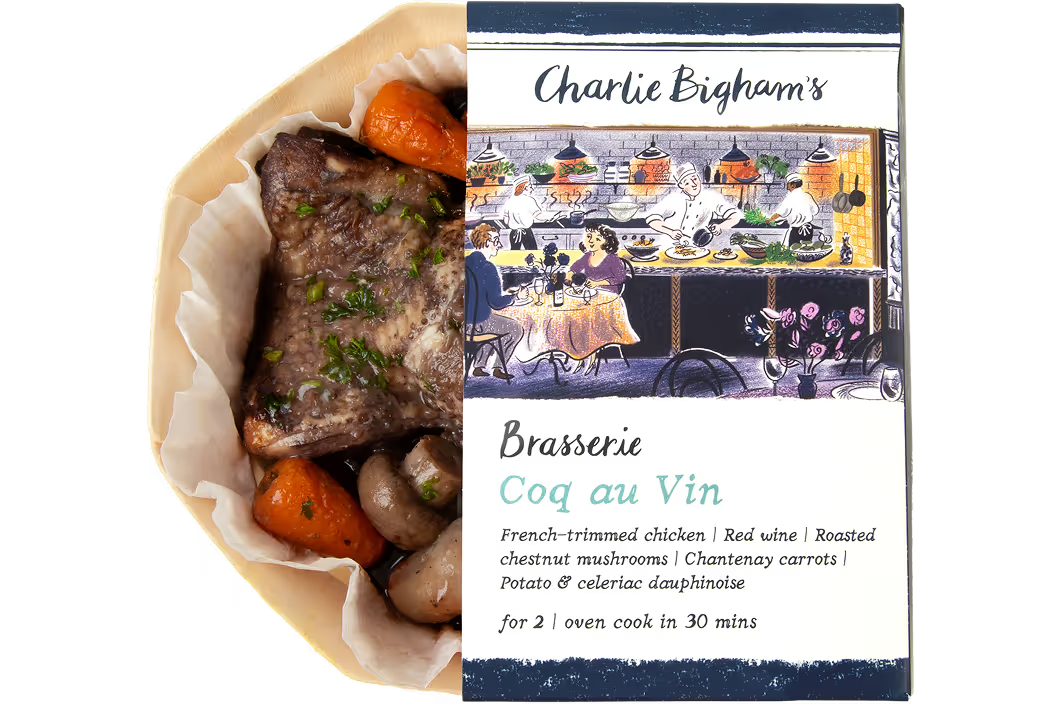
Wine Pairings
Classic Pairing: Beaujolais (Villages or Cru)
Suggestion: Dominique Piron Beaujolais Villages, £14.40
Made from 50-year-old vines in the beautiful region of Beaujolais, this is a more serious take on the style with bright, juicy red fruits and a touch of violet. A modern classic match for this dish.
Alternative Pairing: South African Red Blend
Suggestion: Reyneke Organic Cabernet Sauvignon Merlot, £11
A traditional blend of Cabernet and Merlot made famous by the wines of Bordeaux, but this one’s from South African producer Johan Reyneke. Rich and concentrated with black fruits and spice, it’s hearty – just like the dish!
Curated by Helen McGinn

Charlie's Tips
- For the best chicken, remove both legs and place them on a lined baking tray in the centre of oven while cooking.
- For an even more decadent sauce, add a small splash of brandy or sherry.

Suggested Side
Green beans and caramelised shallots
250g green beans, trimmed
3 shallots, thinly sliced
3 tbsp olive oil (or butter for a richer flavor)
Salt and pepper to taste
Instructions
Bring a pot of salted water to a boil. Add the green beans and cook for 2–3 minutes, until bright green. Drain and plunge the beans in cold water to stop the cooking. Set aside.
In a medium skillet, heat olive oil over a low heat. Add your shallots and cook slowly for 10 minutes, stirring occasionally, until they’re soft, golden, and slightly caramelised. Season with salt and pepper.
Add the green beans into the skillet and toss gently over a medium heat to combine.
(Optional extra: Sprinkle with some chilli flakes or toasted almonds for a further elevated finish!)
Duck Confit
About
Gressingham Duck legs are slowly cooked in their own fat with garlic, thyme, and rosemary until tender and flavoursome. They are finished with a garlic parmesan crumb then placed atop an opulent red wine and Pedro Ximénez sauce containing caramelised onion, smoked bacon and lentils. This is paired with a brown butter Pommes Anna which is a classic French dish made up of layered potatoes and parmesan. An absolute classic, cooked at home.

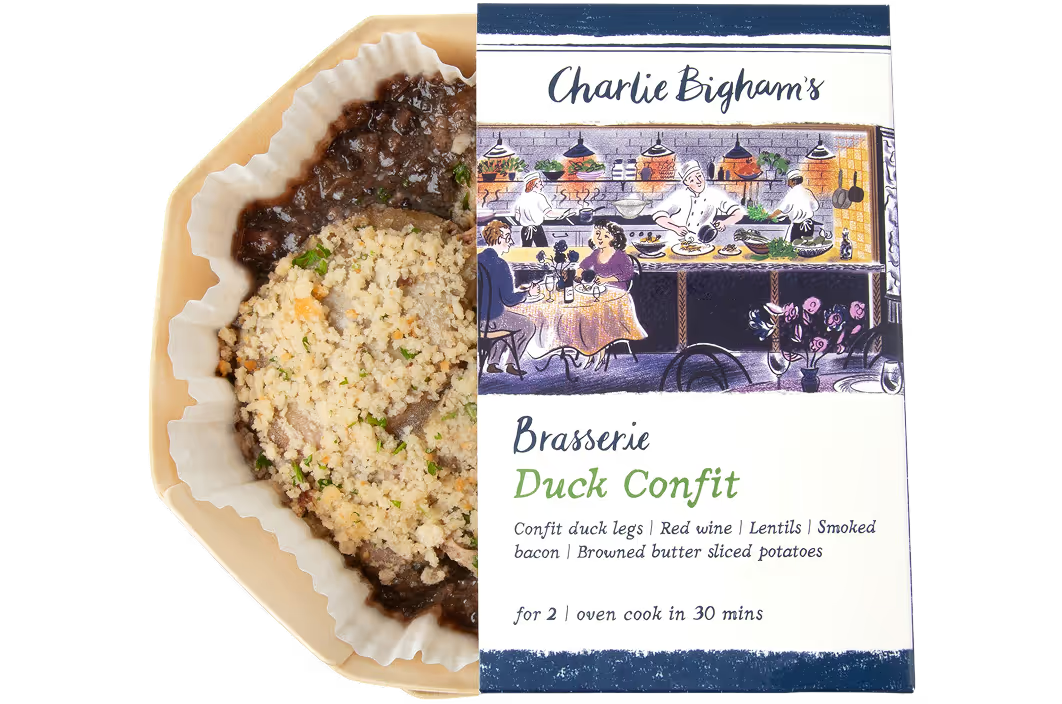
Wine Pairings
Classic Pairing: Chianti Classico
Suggestion: Villa Cafaggio Chianti Classico, £16
The richness of the duck and intense flavours of the sauce calls for a wine that can handle both. This brilliant organic Chianti Classico is ideal, with black cherry flavours, silky tannins and incredible freshness.
Alternative Pairing: Argentinian Malbec
Suggestion: Catena Malbec, £13
A bigger, bolder red made from Argentina’s star grape Malbec, this is made from some of the best high altitude vineyard sites in Mendoza. With its brooding plum fruit flavours and gentle spice, it’s a great match for duck confit.
Curated by Helen McGinn

Charlie's Tips
- For the best duck, remove both legs and place them on a lined baking tray in the centre of oven while cooking.

Suggested Side
Carrots Vichy (Glazed French Carrots)
3 medium carrots, peeled and sliced into thin rounds
20g butter
1 tsp sugar (or honey)
100ml water
Salt and pepper to taste
Optional: chopped parsley or thyme to finish.
Instructions
Melt the butter in a shallow saucepan over medium heat.
Once melted add the carrots, sugar, water, and a pinch of salt then stir until combined.
Simmer for 10 minutes covered, then remove the lid and cook for 10 minutes more, or until the water has evaporated off.
(Optional Extra) Garnish with chopped parsley and thyme.
Venison Bourguignon
About
Wild-caught venison shoulder, from the Scottish Highlands is marinated with thyme and black pepper, then slow-braised in red wine until meltingly tender. The venison is served in a rich sauce with whole Borettane onions, smoked bacon, roasted chestnut mushrooms and specially sourced Chantenay carrots. This mouthwatering dish is paired with indulgent brown butter mashed potato and crowned with a Parmesan crumb.

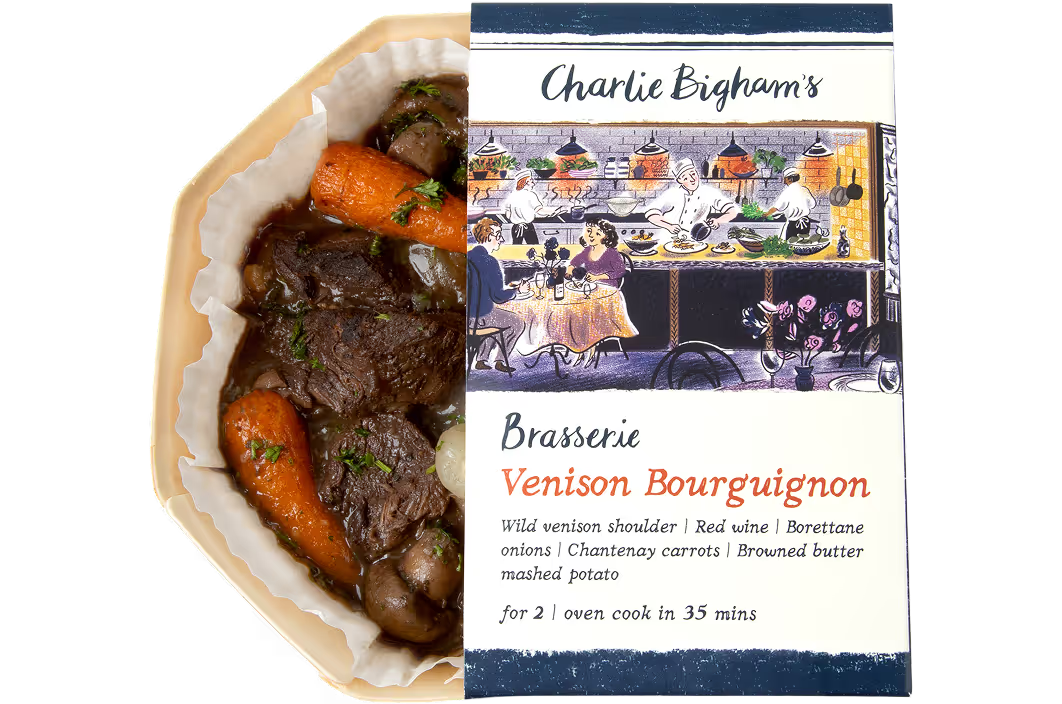
Wine Pairings
Classic Pairing: Red Burgundy
Suggestion: Cave de Lugny Bourgogne Pinot Noir, £17.50
When the dish has the name ‘Bourguignon’ in the title, you go with Burgundy! This Pinot Noir from one of the top co-operative producers in the region captures the best of the grape with red cherry and raspberry flavours. An effortless match.
Alternative Pairing: New Zealand Pinot Noir
Suggestion: Nanny Goat Pinot Noir, £20
Sticking with Pinot Noir, this one’s from New Zealand’s Central Otago region in the South Island and produces a more intense, black fruit-loaded take. One for those who like their wines with plenty of oomph.
Curated by Helen McGinn

Charlie's Tips
- For the perfect cook, after 25 minutes in the oven remove the foil and stir the bourguignon. Leave it to cook for another 10 minutes without the foil.
- For an even more decedent sauce, add a splash of brandy or sherry.

Suggested Side
Roasted Hispi Cabbage
Olive oil
1/2 tsp Garlic Powder
Salt and pepper to taste
(Optional) Chilli Flakes
Instructions
Preheat the oven to 200℃ (fan) / 220℃ (electric) / Gas 7. (This is perfect, as you can cook your bourguignon alongside it).
Remove the outer leaves of the cabbage then chop it in half and then into wedges.
Rinse the cabbage wedges and pat them dry.
Arrange the wedges in a single layer on an oven tray lined with baking paper.
Drizzle the cabbage with olive oil and season to taste.
Roast for 30 minutes
Find Charlie Bigham's
Brasserie in your nearest store
Brasserie in your nearest store
Desserts fitting of a Brasserie
And if you’re looking for a sweet treat to finish off your Brasserie experience, this recipe from Charlie’s cookbook is the perfect choice to round out the evening without too much fuss.
Poached Pears
There’s something rather special about finishing a hearty Brasserie meal with these poached pears. Slow-cooked until rich, dark and full of flavour, they’re the perfect accompanyment to one of our Brasserie dishes. A little sweet, a little spiced, they round off the evening beautifully, especially with a spoon of crème fraîche or a scoop of ice cream.
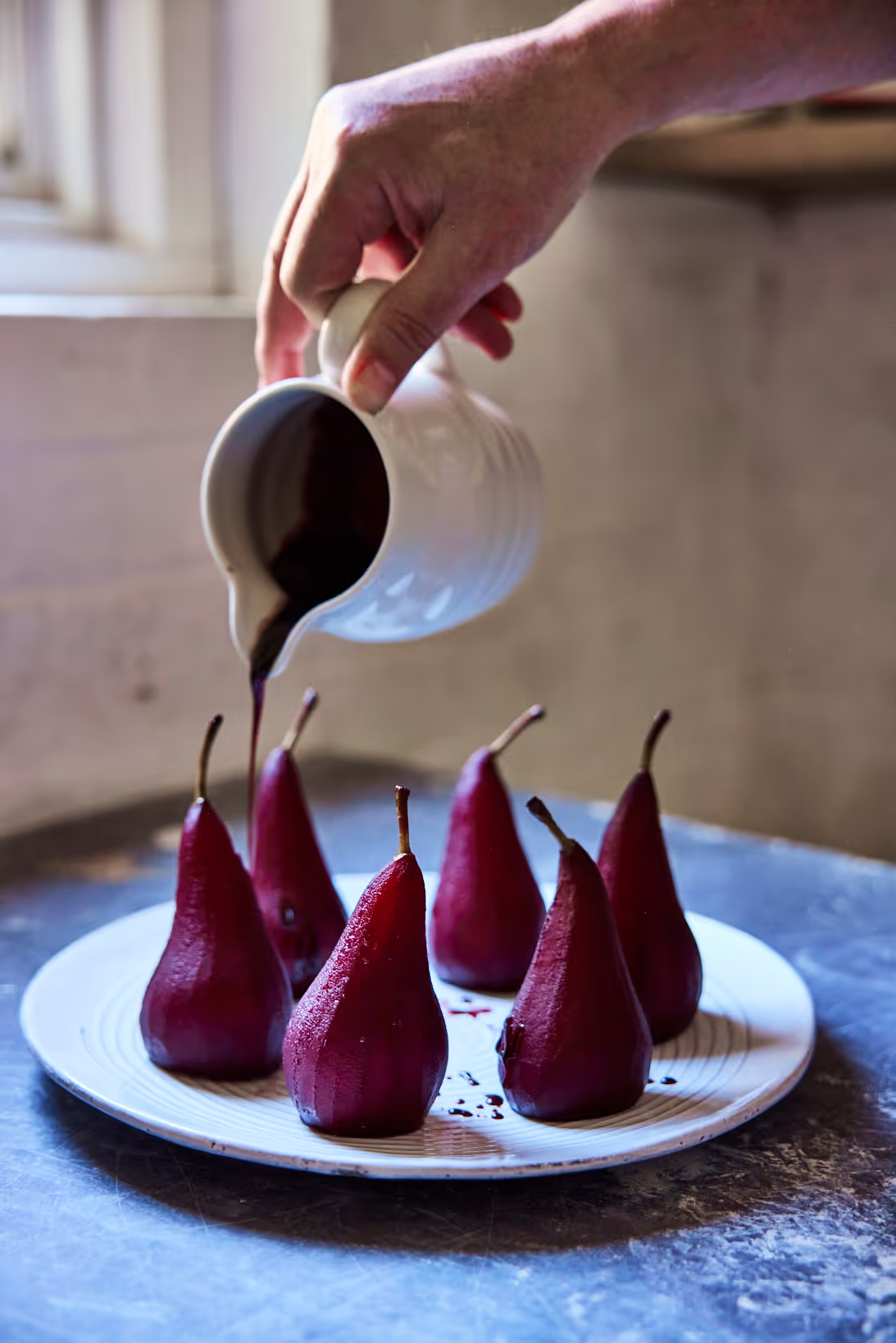

How to turn your home into a Brasserie
3. Add finishing touches
Place a short stem of your favourite flower (unscented or very lightly scented) in a vase or cup at the centre of the table - low enough to allow easy eye contact. Light a candle in the middle of the table (not too close to the flower!) and dim the lights to complete the ambience.
2. Set the table
Drape a tablecloth over your table, aiming for a 30 cm drop from the edge. Place a large plate in front of each chair. Fold thick napkins that complement your tablecloth and tuck the cutlery inside, using the heavy cutlery for a premium feel. You don’t need to buy a new set! Charity shops are a great place to find premium cutlery. Position the water glass to the top right of the plate and the wine glass at a 45 degree angle to the bottom right of the water glass. Repeat these steps for each setting around the table.
1. Prepare the atmosphere
Open a bottle of red wine and let it breathe for about 15 minutes. Start the specially curated Brasserie playlist to set the mood.
Meet Helen McGinn
Helen McGinn is a wine writer and broadcaster, international wine judge and bestselling fiction author. She is also the author of the award-winning blog, Knackered Mother’s Wine Guide.
After spending almost a decade working as a wine buyer for a leading UK supermarket, Helen decided to share her expertise with the public. Helen is a regular expert on BBC1’s Saturday Kitchen Live, and ITV’s This Morning as their resident wine expert.
When she’s not on set, Helen writes a regular drinks column for Waitrose Food Magazine. Helen’s informative and warm writing style has won her the award for Fortnum & Mason’s Online Drink Writer of the Year and she is also a regular judge for the annual International Wine Awards.
In her spare time, Helen enjoys collaborating with friend Kat Farmer on their event series, WINETIME. WINETIME focusses on bringing Kat and Helen together with their audience to celebrate exciting wines and spirits and share their wine knowledge in a fun and friendly environment.
Helen has authored four non-fiction titles about wine and drinks, and five fiction books. Her latest book, Under a Riviera Moon, was published in April 2025.



Brasserie FAQs
Our Brasserie range is exclusively stocked in Waitrose and available in selected stores only. To find your nearest Waitrose location for this range please use the store locator on this page.Brasserie Store Locator
Charlie Bigham's Brasserie dishes are handmade by our chefs so you can enjoy an extra special meal to make your evening together truly memorable. As you would find across top Brasserie restaurants, our chefs hand roll the wellingtons for a perfect pastry finish and marinate chicken legs in our Coq au Vin dish for at least 6 hours to infuse flavours from red wine.
We have sourced restaurant quality ingredients for our dishes; for example wild shot venison from private estates across the Scottish Highlands, Sashimi grade salmon fillets and duck legs & duck fat from Gressingham. Our chefs use butchery skills you’d find across restaurants to trim beef fillet from the UK and French trim chicken legs to deliver an easy, clean eat. Our range of vegetables also mirrors top notch ingredients you’d find in your favourite Brasserie style restaurant, for example Chantenay carrots, Borettane onions and browned butter
mashed potato.
Where does your duck come from?
We have partnered with Gressingham to source restaurant quality duck legs from their farms, which are Red Tractor assured in Great Britain
Where does your venison come from?
We source our venison across the Scottish Highlands from 300 different private estates from Balmoral to Blair Atholl.
How are the deer kept/reared?
The Venison is 100% wild and sustainably sourced.
What cut of salmon do you use in this dish?
We use sashimi grade salmon fillets that have been carefully trimmed of skin and pin-boned to remove as many bones as possible.
Is the salmon in this dish wild caught or farmed?
We use farmed Atlantic salmon sourced from Scotland & Norway and these farms are Global GAP certified.
How do I serve/carve your Salmon Wellington?
For the cleanest serve, cut into the pastry with a bread knife, then continue with a carving knife.
What cut of beef do you use in this dish?
Our Brasserie Beef Wellington is made with beef fillet.
How do I carve/serve the Beef Wellington?
For the cleanest serve, cut into the pastry with a bread knife, then continue with a carving knife.


